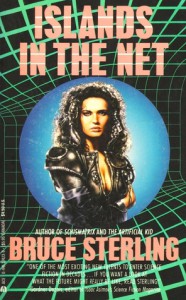Bloody Jack: Being an Account of the Curious Adventures of Mary Jacky Faber, Ship's Boy (Bloody Jack Adventure Series #1)
 I'm listening to the audio version and I can't imagine a more joyful listen. Katherine Kellegrin's narration is outstanding, the most masterful, actorly reading I've encountered in an audio book. The story itself makes the fear of discovery the principal point of tension, as orphan Mary Farber tries to escape the wretched life of a street urchin by joining the Royal Navy as "Jacky," a ship boy. The period details and lingo are perfectly balanced to make the setting come alive while never slowing down the story. As sheer entertainment, this book ranks amongst the best.
I'm listening to the audio version and I can't imagine a more joyful listen. Katherine Kellegrin's narration is outstanding, the most masterful, actorly reading I've encountered in an audio book. The story itself makes the fear of discovery the principal point of tension, as orphan Mary Farber tries to escape the wretched life of a street urchin by joining the Royal Navy as "Jacky," a ship boy. The period details and lingo are perfectly balanced to make the setting come alive while never slowing down the story. As sheer entertainment, this book ranks amongst the best.
Self-Editing for Fiction Writers, Second Edition: How to Edit Yourself Into Print
 I've read about a dozen books on writing and almost always end up disappointed by either how obvious the advice is or how little attention given to how to implement it in your own writing. This book excels where the others have failed. As I read, I had to fight the urge to open my manuscript and start editing right away. Nothing about the authors editing principles are leading: they aren't giving techniques to write a particular type of novel, other than a well-crafted, engaging one. I'll be giving this book as a gift to any friend who finishes a first draft.
I've read about a dozen books on writing and almost always end up disappointed by either how obvious the advice is or how little attention given to how to implement it in your own writing. This book excels where the others have failed. As I read, I had to fight the urge to open my manuscript and start editing right away. Nothing about the authors editing principles are leading: they aren't giving techniques to write a particular type of novel, other than a well-crafted, engaging one. I'll be giving this book as a gift to any friend who finishes a first draft.
The Hunger Games (Hunger Games Series #1)
 I am deeply conflicted about this novel. It is amazingly plotted with compelling characters and is almost impossible to put down. Yet, I came away feeling I'd read something very disposable. The central premise that allows for the Lord of the Flies über violence is so contrived and unrelated to even the most horrific nation's actual state that the metaphorical value is lost. I feel this is a message book without a message that stands up to two seconds of thought. It's well enough written to avoid being mere violence porn and stands out from the spate of vacuous vampire novels that have plagued YA lately, but compared to a book like Scott Thompson's The Pretties cycle, this is far from a deep novel.On an unambivalent note, the cover art is simply brilliant.
I am deeply conflicted about this novel. It is amazingly plotted with compelling characters and is almost impossible to put down. Yet, I came away feeling I'd read something very disposable. The central premise that allows for the Lord of the Flies über violence is so contrived and unrelated to even the most horrific nation's actual state that the metaphorical value is lost. I feel this is a message book without a message that stands up to two seconds of thought. It's well enough written to avoid being mere violence porn and stands out from the spate of vacuous vampire novels that have plagued YA lately, but compared to a book like Scott Thompson's The Pretties cycle, this is far from a deep novel.On an unambivalent note, the cover art is simply brilliant.
Islands in the Net
 This remains my favorite Sterling novel. Set in the near future (from when it was written), it's amazingly prescient about the danger of failed states as breeding grounds for terror. While some of his technological predictions are hilariously off the mark (most notably, the fax machine as an important communication device), his explorations of how poverty shapes politics remains compelling. It's all wrapped up in a quick-paced story with a memorable, rich protagonist. I don't believe this remains in print—a shame—but if you stumble across it at a used bookstore, don't let the horrible cover art dissuade you. This is well worth any speculative fiction readers' time.
This remains my favorite Sterling novel. Set in the near future (from when it was written), it's amazingly prescient about the danger of failed states as breeding grounds for terror. While some of his technological predictions are hilariously off the mark (most notably, the fax machine as an important communication device), his explorations of how poverty shapes politics remains compelling. It's all wrapped up in a quick-paced story with a memorable, rich protagonist. I don't believe this remains in print—a shame—but if you stumble across it at a used bookstore, don't let the horrible cover art dissuade you. This is well worth any speculative fiction readers' time.






 1
1